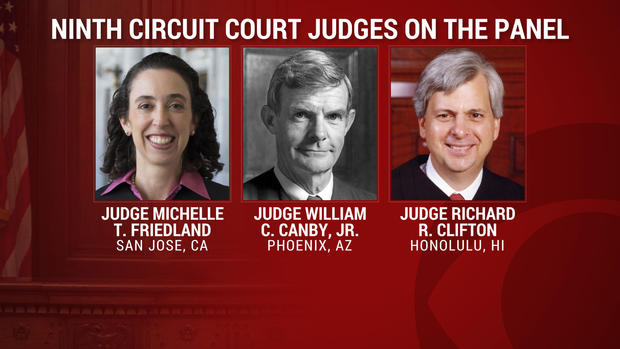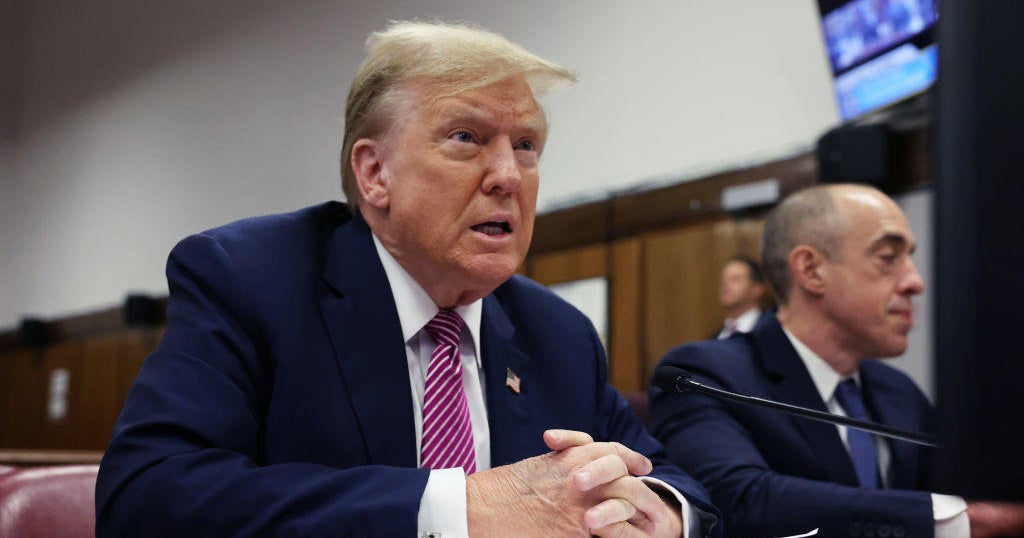Appeals court hearing on Trump travel ban - live blog
7:08 p.m. ET The hearing has concluded, with Friedland noting the court will work to deliver its decision quickly.
7:05 p.m. ET The judges came back to the hypothetical question of if this executive order had been a ban on all Muslims, with Judge Friedland posing that question again to Flentje.
“If there were an executive order that prevented the entry of Muslims, that -- there would be people with standing to challenge that and I think that would raise Establishment Clause, First Amendment issues,” Flentje replied. “But that’s not the order we have here. This order is limited to the countries defined by Congress.”
Asked, though, about the publicly acknowledged quotes in which Mr. Trump and his advisers have discussed plans for a Muslim ban, Flentje said the court shouldn’t be making its decision based on those public statements.
“It’s extraordinary for the courts to enjoin a president’s national security decision-making based on some newspaper articles,” he said. “And that’s what has happened here.”
Judge Clifton pushed back, saying he understands the argument that those public statements “shouldn’t be given much weight,” but said, “If they were made, it is potential evidence, it is a basis for argument.”
7:00 p.m. ET Purcell has finished his oral arguments. The judges gave Flentje five minutes for his rebuttal.
6:58 p.m. ET One judge noted to Purcell that past presidential orders have limited immigration from specific countries before, and asked him why this executive order should be considered differently when having nationality-specific requirements “seems to be commonplace in foreign affairs.”
“Every one of those examples involved much more narrow tailoring than we have here,” he replied.
6:50 p.m. ET The judges noted that Muslims from the seven affected countries only constitute a fraction of Muslims worldwide, asking Purcell whether there is a reason for the travel ban besides religion.
“Do you deny that there is concern about people coming from those countries separate and apart from what their religion might be?” Judge Clifton asked.
Purcell said it can be inferred from “intent evidence,” given Mr. Trump’s past calls for a ban on all Muslims entering the U.S.
“In part you can infer it from intent evidence,” he said. “There are statements that we’ve quoted in our complaint that are rather shocking evidence.”
Judge Canby noted there’s a difference between allegations and definitive proof. “Do I have to believe everything you allege?” he asked Purcell.
Purcell replied, “We’ve presented an enormous amount of evidence.”
6:47 p.m. ET The judges asked Purcell why the order isn’t, as the government side argued, overbroad -- and why it shouldn’t only apply to people who reside in the U.S. or are connected to the U.S. in some way, rather than all people entering the U.S. from the seven affected countries.
“Limiting the order in that way would not address all the harms the order is causing,” Purcell replied.
6:43 p.m. ET Purcell, who is getting fewer questions from the judges than Flentje thus far, argued that the Trump administration has not adequately shown what “irreparable harm” would result from keeping the travel ban on hold.
The government side has made “no clear factual claim or evidentiary claims from what that irreparable harm would be” he said, adding: “It was the executive order itself that caused irreparable harm.”
6:32 p.m. ET Next up is the lawyer for Washington and Minnesota, Noah Purcell.
Purcell argued that the judicial branch has “always” had the role of saying what the law is and curbing “abuses by the executive branch” -- and said that role has “never been more important in recent memory than it is today.”
Reinstating the travel ban would “throw this country back into chaos,” he said, and the court “should decline that.”
6:29 p.m. ET Flentje moved on to his next point, saying, “I’m not sure I’m convincing the court.”
He argued that the lawsuit against the executive order is “overbroad,” and said the court should immediately place a stay on the injunction, “even if the court thinks some aspects of the order are problematic.”
6:27 p.m. ET The judges are now asking Flentje a hypothetical question: what if this travel ban were a ban on Muslims, as Mr. Trump had initially asked for?
“Could the president simply say in the order, ‘We’re not going to let any Muslims in?”
“That’s not what the order does here,” Flentje replied.
Canby asked the same question several more times, but each time Flentje said, “That’s not what the order does.”
6:20 p.m. ET The discussion has now moved on to whether the states bringing the suit, Washington and Minnesota, have legal standing to challenge the executive order. Flentje, the Justice Department’s lawyer, says they do not have the standing to bring a lawsuit on behalf of state residents.
6:12 p.m. ET The judges on the panel are questioning Flentje about what evidence the Trump administration has to back up its claim that the travel ban was necessary to prevent real “risks” to the country.
Flentje named one example, saying there are “a number of people” from Somalia tied to the terror group al-Shabaab who have been arrested in the U.S., but did not present other examples or evidence. He said the “quite fast” pace of this legal process has kept him from bringing other evidence tonight.
“These proceedings have been moving quite fast and we’re doing the best we can,” he said.
“Why should we be hearing this now if it sounds like you’re trying to say you’re going to present other evidence later?” Circuit Judge Michelle Friedland responded.
6:07 p.m. ET Flentje argues that the executive order is constitutional because Congress gives the president authority to deny entry to the country to individuals when there’s a concern they could be harmful to the country.
“This judgment was well within the president’s power as delegated to him by Congress and it is constitutional as the court in Boston … recently held,” Flentje said, adding that Congress has “expressly authorized” the president to suspend entry for individuals who may be “detrimental to the interests of the United States.”
“That’s what the president did here,” he said.
6:02 p.m. ET Arguments are now underway, with August Flentje arguing on behalf of the Trump administration.
5:50 p.m. ET Since President Trump signed his “extreme vetting” executive order banning travel to the U.S. by individuals from seven countries, the measure has faced a number of legal challenges -- and the process continues tonight with a hearing in the 9th Circuit Court of Appeals.
A three-judge panel will hear oral arguments by phone -- 30 minutes for each side at 6 p.m. ET, and the court is reportedly live streaming the arguments on its website. The court in this case is not ruling on the merits of the travel ban, only on the Seattle judge’s nationwide injunction which remains in effect.
A ruling is not expected Tuesday evening but could be handed down this week.
The order, signed on Jan. 27, has not been in effect since Feb. 3, when a federal judge in Seattle imposed a temporary restraining order, and it may well remain halted for the next few weeks -- at least.
The latest halt on Mr. Trump’s ban came when U.S. District Court Judge James Robart, a George W. Bush appointee, issued a temporary restraining order blocking the travel ban’s implementation “on a nationwide basis.” Washington state, Minnesota and Hawaii argue that the temporary restraining order, which blocks the travel ban, should remain in place.
This has the effect of nullifying Mr. Trump’s executive order. In essence, for now, it’s as if Mr. Trump’s “extreme vetting” executive order had never been written. The restraining order should last 14 days unless it’s overturned on appeal.
The Justice Department then appealed, filing a brief with the 9th Circuit Court of Appeals that argued that the president alone has the right to determine who should be allowed to enter the country and who should not. The 9th Circuit denied the Trump administration’s attempt to immediately reinstate the ban, and asked for briefs from Washington state, Minnesota and the Justice Department.




